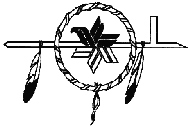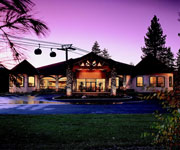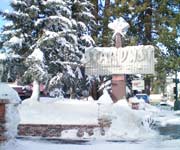- Check your alternator and fan belts. All belts should be tight with no signs of cracking or shredding. If you replace a belt that is still operational, save it for a spare in an emergency.
- Check your battery and cables. Remove all of the corrosion on the terminals with a 10:1 mixture of water and baking soda. This will neutralize the acid. The battery cables should be clean and tight.
- Check all fluids in your car for proper levels, including the engine and transmission oil, antifreeze, windshield cleaner and de-icer and battery water. Make sure you have plenty of gas to get where you want to go, don't take a chance of running out in a snow storm.
- If you are not familiar with your vehicle, a good way to start the winter season is with a complete tune-up, it could save your life.
- Use a current map of the area and tell someone where you are going, what routes you'll be taking and when you will return. If you find yourself going down a road that is getting worse, turn around, the farther you go into the wilderness, the less a road is traveled, so conditions will not get better and may even trap you. Hundreds of travelers die needlessly because they are not prepared for an emergency.
USE COMMON SENSE
CalTrans Road Conditions: 800-427-7623
AAA Snow Report: 415-864-6440
CalTrans Road Conditions: 800-427-7623
AAA Snow Report: 415-864-6440
Winter Emergency Kit
Here are a few things that I have in my vehicle at all times in the event of an emergency.
- Tire chains. Make sure they fit before you need them in the snow and it's a good idea to keep a chain repair kit handy.
- A basic tool kit with jumper cables. The cold weather is very hard on batteries
- Emergency road flares. "This is a must." I can't stress enough how important flares are in an emergency. They're also great for starting a fire when all you have is wet wood.
- An extra set of dry clothes, name brand insulated boots with wool socks, a sleeping bag, foul weather gear, insulated gloves, jackets and headgear. Wool clothing or a wool blanket is important because it will keep you warm even when wet.
- An emergency survival pack with high energy food bars, like Stoker or Cliff Bars, dried fruit or jerky (I make my own). Food is a luxury, but water is a necessity, so have have plenty of extra drinking water and water purification tablets with you. Hydrate or die!
- A signaling mirror, matches, disposable lighters and a multi-purpose knife. The Leatherman "Super Tool", is what our outdoor groomer, patrollers and snow removal people use. I have not seen a better tool on the market.
- You'll need a good, heavy duty flashlight. I have a Petzel(TM) "Hands Free" head lamp, which I highly recommend, and keep extra batteries for emergencies.
- In every pack there should be a compass, a whistle (use instead of yelling), a space blanket, small tarp, pencil and paper, large garbage bags, duct tape, woven line, a small shovel, tow rope, windshield ice scraper and a First Aid Kit. (A cellular phone also comes in handy.)
There are some very important things to be aware of in any emergency situation. You must keep a positive mental attitude and don't panic. Stay calm and use your head, it is your best survival tool in any situation.
It's very important to protect yourself from exposure. The wind-chill factor increases your risk of hypothermia and frostbite. Most cases of hypothermia occur well above freezing. If you run your vehicle to keep warm, be aware of the dangers of carbon monoxide poisoning. Remember, a raised hood on your vehicle lets people know you need help.
These items are only some of the bare essentials you may need in an emergency. I encourage you to educate yourself and be prepared.
Have a Safe Winter - Gene "Wild Wild" West
 Menu
Menu









